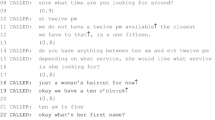Abstract
Interpretation of utterances affects an interrogator’s determination of human from machine during live Turing tests. Here, we consider transcripts realised as a result of a series of practical Turing tests that were held on 23 June 2012 at Bletchley Park, England. The focus in this paper is to consider the effects of lying and truth-telling on the human judges by the hidden entities, whether human or a machine. Turing test transcripts provide a glimpse into short text communication, the type that occurs in emails: how does the reader determine truth from the content of a stranger’s textual message? Different types of lying in the conversations are explored, and the judge’s attribution of human or machine is investigated in each test.
Similar content being viewed by others
References
16th Loebner Prize for Artificial Intelligence (2006). Home of the Loebner prize: http://loebner.net/Prizef/2006_Contest/loebner-prize-2006.html. Accessed 4 Nov 2013
Adler J (1997) Lying, deceiving or falsely implicating. J Philos 94:435–452
Carson T (2006) The definition of lying. Nous 40(2):284–386
Copeland B (2004) The essential Turing—the ideas that gave birth to the computer age. Clarendon Press, Oxford
Erat S (2013) Avoiding lying: the case of delegated deception. J Econ Behav Organ 93:273–278
Eugene Goostman Transcript (2008). 18th Loebner prize for artificial intelligence contest. University of Reading: http://www.loebner.net/Prizef/2008_Contest/Eugene.pdf. Accessed 4 Nov 2013
Fallis D (2009) What is lying? J Philos 106(1):29–56
Freitas-Magalhães A (2013) The face of lies. FEELab Science Books, Porto
Hancock J, Curry L, Goorha S, Woodworth M (2007) On lying and being lied to: a linguistic analysis of deception in computer-mediated communication. Discourse Process 45(1):1–23
Kobsa A (1990) User modelling in dialog systems: potentials and hazards. AI & Soc 4(3):214–231
Leslie I (2011) Born liars. Quercus, London
Linstead S (1985) Jokers Wild: the importance of humor in the maintenance of organizational culture. Soc Rev 33(4):741–767
Maitland C (1999) Global diffusion of interactive networks: the impact of culture. AI & Soc 13(4):341–356
Meibauer J (2005) Lying and falsely implicating. J Pragmat 37:1373–1399
Shah H (2010) Deception detection and machine intelligence in practical Turing tests. PhD thesis, University of Reading, UK
Shah H (2013) Conversation, deception and intelligence: Turing’s question-answer game. In: Cooper SB, van Leeuwen J (eds) Part III: Building a brain, intelligent machines, practice and theory. Alan Turing: his work and impact. Elsevier ISBN: 9780123869807
Shah H, Warwick K (2009) Emotion in the Turing test: a downward trend for machines in recent Loebner Prizes. In: Vallverdú J, Casacuberta D (eds), Handbook of research in synthetic emotions and sociable robotics: new applications in affective computing and artificial intelligence, pp 325–349. IGI Global: doi:10.4018/978-1-60566-354-8
Shah H, Warwick K (2010a) Testing Turing’s five minutes, parallel-paired imitation game. Kybernetes 39(3):449–465
Shah H, Warwick K (2010b) Hidden interlocutor misidentification in practical Turing tests. Minds Mach 20(3):441–454
Turing A (1950) Computing, machinery and intelligence. Mind LIX(236):433–460
Vrij A, Granhag PA (2012) Eliciting cues to deception and truth: what matters are the questions asked. J Appl Res Mem Cogn 1:110–117
Warmelink L, Virj A, Mann S, Jundi S, Granhaj PA (2012) The effect of question expectedness and experience on lying about intentions. Acta Psychol 141:178–183
Warwick K (2011) Artificial intelligence: the basics. London, Routledge
Warwick K, Shah H (2013) Good machine performance in Turing’s imitation game. IEEE transactions on computational intelligence and AI in games. doi:10.1109/TCIAIG.2013.2283538
Warwick K, Shah H, Moor J (2013) Some implications of a sample of practical Turing tests. Minds Mach 23(2):163–177
Acknowledgments
The authors would like to thank those whose financial support made the Bletchley Park tests possible: William Beer, Director of Information and Cyber Security at Price Waterhouse Coopers; Clare McFarlane at Artificial Solutions; Maggie Berry of Women in Technology; David Burden of Daden Ltd; Phil Hall, CEO of Elzware Conversation Systems; Keith Harrison of Existor Ltd; Raspberry Pi Computers for the best child judge award; and last but not least, The Colonnade Hotel (birthplace of Alan Turing) for the winning machine trophy. We thank the developers for accepting our invitation allowing their machines to participate in this experiment: Rollo Carpenter and Existor for Cleverbot, Fred Roberts and AI Solutions for Elbot, Robert Medeksza and Zabaware for Ultra Hal, Robby Garner and the Turing Hub for JFred, and lastly, the winner of the best machine Eugene Goostman from Vladimir Veselov and his team.
Author information
Authors and Affiliations
Corresponding author
Rights and permissions
About this article
Cite this article
Warwick, K., Shah, H. Effects of lying in practical Turing tests. AI & Soc 31, 5–15 (2016). https://doi.org/10.1007/s00146-013-0534-3
Received:
Accepted:
Published:
Issue Date:
DOI: https://doi.org/10.1007/s00146-013-0534-3




